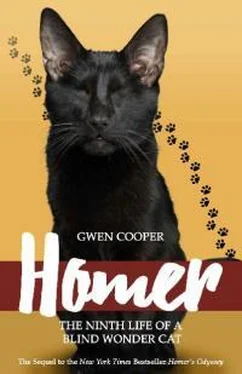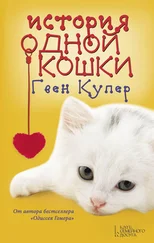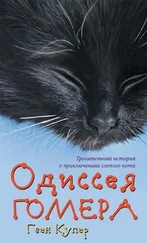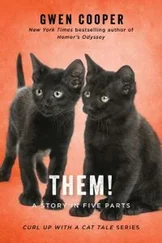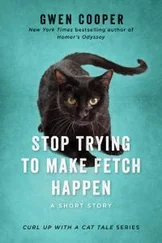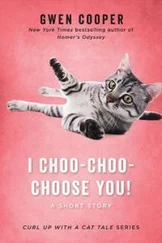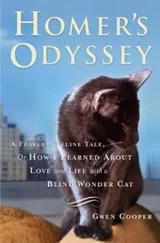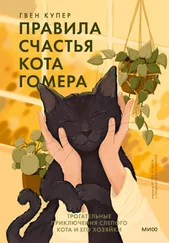But then, unbidden, a memory came back to me. When the vet had come to us on Homer’s last day, she’d wrapped him in a blanket when it was over, leaving only his face revealed. She’d then placed his body tenderly in a bag she’d brought with her—a roomy leather bag with handles.
The bag containing Homer had remained opened and unzipped on the floor while I signed papers and made arrangements for the cremation. And Clayton had climbed into it. I’d thought it merely the natural curiosity of any cat to explore an open bag left on the floor. But, when we’d tried to lift him out, Clayton had clung to the blanket around Homer, whining anxiously as we’d fought to pull him away.
Grief has a way of making us selfish. As many people as had mourned for Homer—and as sincere and deep as I’d known that mourning to be—I’d been sure that nobody’s loss could equal my own. Homer had been my cat, his loss had been my loss—and there was no one, I thought, who could truly know how I felt.
Clayton lay on the exam table between the doctor and me, the gold of his eyes dulled from their usual bright alertness. But when I placed my hand down on the table next to him, he laid one small, black paw over it and looked up into my face.
I had been wrong. There had been another who’d known how I felt. Someone else had felt his happily ordered world run off course, had lost his hero and very best friend, not understanding why that friend was gone and couldn’t come back to play with him anymore.
He just hadn’t known how to tell me.
My voice was gritty when I spoke. “Our oldest cat…” The words stuck, and I realized that, for all the blogs and emails and Facebook posts, I hadn’t actually said it aloud to anyone. Not once. Not in all this time.
I cleared my throat and tried again. “Our oldest cat died a few weeks ago. Clayton was very attached to him.”
I felt the relief of saying it—just saying it as a commonplace statement, to a person who didn’t know Homer or that I was “Homer’s mom,” who would greet the idea with nothing more than ordinary, professional sympathy—pass through me. It felt like having a rusty gate you’d been pushing and pushing against finally begin to swing open, just a crack.
“I’m so sorry,” the vet said. “That could certainly do it.”
“But Clayton will…” I cleared my throat a second time. “He will be okay, right? I did get him here in time?” Not again, I thought. Please not again, not now, not so soon…
“I think he’ll be fine,” she replied. “He’ll have to stay with us for two or three days so we can clear the blockage and get everything flowing the way it should. Let me take him back now and get him started. You can wait up front for the receptionist to bring the papers you’ll need to sign.”
CLAYTON WAS AWAY for three days. I’d always gone to visit our other cats when they’d had overnight hospital stays. When Clayton had his leg removed, I’d seen him at least once a day. He’d had to stay for two weeks then, so he could be crated while his stitches healed. It was impossible to imagine otherwise how we would have kept a rambunctious kitten stable enough not to risk the stitches—or how we would have kept Fanny, who groomed him daily, from going after them herself. Keeping Clayton crated at home—in full view of the rest of us interacting with each other, but not with him—had seemed unnecessarily torturous. But I’d gone to see him every afternoon and brought him treats. And the doctor and other staff members had taken him periodically into an empty exam room for brief bouts of closely supervised play. He’d seemed nothing but happy when I’d visited him then, surrounded by toys that he batted around playfully when he was in his cage, and by adoring humans during the brief times he was allowed out of it.
This time, however, the hospital asked that I not come and visit. It was important that Clayton remain hooked up to tubes and catheters around the clock, and unhooking him long enough for a visit from me was, I was told, an undesirable option. I called three times each day to check on him, and at a minimum I knew that Clayton was still the easy patient, as compliant with staff as he’d always been. The day when I finally went to bring him home, a tech handed over his carrier and informed me, “Clayton is the most adorablest cat ever.” Which told me that his usual sunny charm must have returned during those three days, at least in part.
I was given a sheet with after-care instructions, a case of a new prescription food, and a bill so steep that I almost reeled. (An emergency animal hospital in Manhattan possibly being the most expensive option for veterinary care anywhere on the planet.) It was worth it, though, as I saw Clayton’s soft carrier pop like popcorn when he heard my voice, and realized that I had come back for him.
Clayton was overjoyed to be released from that carrier once we got home—although taken aback by Fanny’s hostile reception. He may have looked like the Clayton she knew, but he smelled like something else altogether, and Fanny backed up and hissed at him angrily whenever he approached. I quickly brought Clayton into our bedroom, which I’d set up ahead of time with a new litter-box, his favorite toys and blankets, and a bowl for his new food. If stress had caused his illness, I didn’t want his recovery set back by the additional stress of rejection. Within a few days, I knew, Clayton would smell like himself again, and he and Fanny could fall back into their established patterns of close companionship.
Laurence came in every so often to check on us, and Clayton scampered over to bonk his head joyously against Laurence’s hand as he bent down to scratch behind Clayton’s ears. Look! I’m back! I’m finally home! But otherwise Clayton and I were alone together for the rest of the night. He bunny-hopped frenetically around the bedroom for a long time, thrilled to be released from the confinement of the hospital, delighted to reacquaint himself with his favorite toys, which he chased with dizzying speed over and under the bed, from one end of the room to the other. Every few minutes he’d jump into his litter-box, releasing a few small dribbles each time, which would have alarmed me if his doctor hadn’t told me to expect this for a day or two.
It was late by the time he’d finally exhausted himself. Switching off the bedside lamp, I crawled beneath the covers and readied myself for sleep. I’d set up a soft pile of blankets and pillows on the floor for Clayton, as he’d never really been a cuddler or expressed much interest in sharing our bed. As friendly as he could be, Clayton wasn’t a lap cat. If I sat on the floor, he’d hop around me in counter-clockwise circles, bumping his head affectionately against my shoulder or back as he went, pausing on occasion to rest in my lap for the briefest of seconds before leaping up and resuming his bunny-hop circles.
I’d never expected that any of our cats would cuddle on demand—Scarlett would certainly have disabused me of any such notion a long time ago. Still, one of the things I missed most about Homer was no longer having a furry little body to curl up with. I missed that feeling of peace that comes only when a small animal trusts you enough to fall asleep in your arms.
So it surprised me, as I got under the blankets, when Clayton climbed onto the bed after me. And then he did something he’d never done before. Hopping across the bed to where I lay, he nosed the covers aside and stretched his body across mine, one hind leg tucked beneath my right arm, while his front paws sprawled out to touch my left. His chest was directly over my chest, his heart aligned with my own. My arms rose from the bed to embrace him, and Clayton nuzzled his nose into my neck, purring gently against my left ear.
Читать дальше
